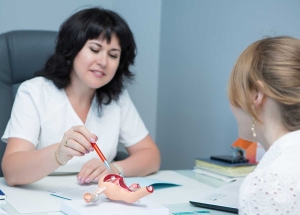Pelvic Floor Dysfunction
Pelvic Floor Dysfunction (PFD) is an umbrella term encompassing problems with pelvic floor muscles, ligaments and the connective tissue that supports the pelvic organs.
 With PFD, the pelvic muscles may be tight, damaged, or weak, which in turn, can lead to loss of bladder and bowel control (urinary or fecal incontinence). Sometimes, but not always, PFD is associated with pelvic pain.
With PFD, the pelvic muscles may be tight, damaged, or weak, which in turn, can lead to loss of bladder and bowel control (urinary or fecal incontinence). Sometimes, but not always, PFD is associated with pelvic pain.
In women, “pelvic-organ prolapse” also can occur, a condition where the pelvic organs drop, causing a bulge in the vaginal canal, which can lead to incontinence or pain during intercourse.
Although these symptoms may be embarrassing, pelvic floor dysfunction is actually quite common, and in most cases, easily treatable.
How We Can Help
At The Kaplan Center, we have years of experience treating patients with pelvic floor dysfunction, and we completely reject the notion that “you just have to live with it.”
At your first visit, your Kaplan physician will take time exploring the onset of your condition, the specific nature of your symptoms and the overall status of your health. You’ll also be asked about the medications and therapies you’ve tried in the past, and what has and hasn’t worked for you.
In addition to assessing possible musculoskeletal and postural problems, you may be evaluated for hormonal or dietary issues that may be contributing to your symptoms. In some cases, specialized diagnostic laboratory testing may be necessary.
After reviewing all of the factors contributing to your condition, your physician will spend time talking with you about your diagnosis and working with you to create a customized and multi-dimensional treatment plan that addresses not only your immediate pain but also any possible underlying or co-existing conditions that may be causing or aggravating your symptoms.
Treatments
Physical Therapy / Pelvic Rehabilitation
Under the umbrella of physical therapy, pelvic rehabilitation is a very effective treatment for pelvic floor dysfunction and is often the first line of treatment. Jeanne Scheele, PT, PRPC, is our pelvic rehabilitation specialist who has devoted over 20 years to helping women and men with pelvic floor disorders improve their quality of life. With specialized training and years of experience, Jeanne has helped patients improve and often overcome the following issues:
- Pelvic pain
- Pain on intercourse
- Pudendal nerve pain
- Bladder pain
- Urinary incontinence, stress, urge, mixed
- Fecal incontinence
- Pelvic organ prolapse
- Abdominal pain from endometriosis
- Lower back pain
- Hip pain
- Groin pain
- Post surgical scar tissue
- Constipation
- Sexual dysfunction
- Men’s bladder and bowel health
Do all Physical Therapists do pelvic rehab?
No. Only physical therapists who have completed post-graduate coursework and who have passed the licensing exam by an accredited institution – identified by the letters PRPC (Pelvic Rehabilitation Practitioner Certification) or CAPP (Certificate of Achievement in Pelvic Health Physical Therapy) after their name – are properly trained in pelvic rehabilitation. They may be licensed in either pelvic or post-partum conditions.
In this day and age, patient care is often divided. For example, a woman may be directed to see a urologist, a gynecologist, or a colorectal doctor, depending on the location of the problem (urethra, vagina, or anus). However, a pelvic rehab specialist will examine all three areas as they are interconnected in pelvic problems and can often eliminate the need to see other specialists.
What happens on the 1st visit for pelvic rehabilitation?
At the Kaplan Center, your first appointment with Jeanne is a 90-minute appointment and will include the following:
- A comprehensive evaluation including a musculoskeletal screen focused on the pelvis, hips, lower back, and abdomen. A full history is taken.
- A pelvic floor assessment using Biofeedback for muscle energy readings.
- Visceral connective tissue manipulation of lower abdomen for hypomobility of organs.
- Discuss patient goals and suggest a plan of care.
What might a follow-up treatment include?
Follow-up treatments are typically 60-minutes. Depending on the problem, your treatment may include any of the following:
- Biofeedback for up-training a weakened pelvic floor and down-training for a hypertonic, or very tight, pelvic floor. The patient has visual feedback for progress.
- Manual therapy for muscle imbalances in hips, lower back, or internal vaginal muscle releases. Coccyx manipulation.
- Visceral connective tissue mobilization for the abdomen.
- CranioSacral therapy
- Cold laser therapy for points of pain or irritability.
- Frequency Specific Microcurrent to target specific tissues in order to reduce inflammation, repair tissue, and relieve pain.
Additional Treatments
Pelvic Rehabilitation is one part of a comprehensive treatment approach. Discussing problems such as gut issues, hormonal issues, sleep patterns, activity levels, and stress levels is important in designing a program for the best outcome. Other treatments available at the Kaplan Center that may be recommended include:
In some cases surgery may be necessary, but in most cases non-surgical treatments can help you reclaim control of your bodily functions and your life.
If you are not currently a Kaplan patient, and have been recommended to see a pelvic rehab specialist, outside referrals from a physician are accepted.
We are here for you, and we want to help.
Our goal is to return you to optimal health as soon as possible. To schedule an appointment please call: 703-532-4892 x2
Additional Resources:
Article: Pelvic Floor Dysfunction: 6 Myths Busted!
Research: Forecasting the Prevalence of Pelvic Floor Disorders National Institutes of Health
Research Review: Biofeedback for pelvic floor dysfunction in constipation BMJ




